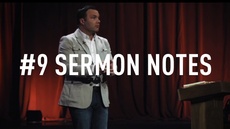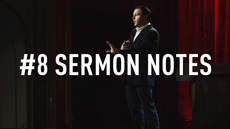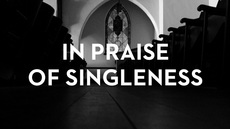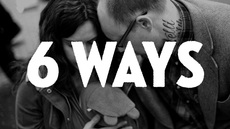From the February 26 sermon “Disgrace and Grace,” preached by Pastor Mark Driscoll:
Sexual assault is an epidemic: 1 of 4 women and 1 of 6 men have been assaulted—including Pastor Mark’s wife, Grace. Sin would leave us as shamed, defiled victims, but in Jesus, we are cleansed from all unrighteousness if today we turn from sin and trust in him.
For more on the issue of sexual assault and the gospel, please see these two important books by Mars Hill pastors and leaders: Rid of My Disgrace by Pastor Justin and Lindsey Holcomb, and Redemption by Pastor Mike Wilkerson.
Sexual assault is an epidemic. It’s one in four women. How many women do you know? One in four. Statistically, the younger they are, the more likely it is. It’s also true for one in six men, and men are highly unlikely to report it for reasons of shame and embarrassment, and so it’s not just women.
If sexual assault is not part of your story, it is part of the story of someone you know.
How many women do you know? How many men do you know? How many do you know closely, and intimately, and personally? Well, statistically, you know a lot of victims, and you probably don’t know that they’re victims, because sometimes they don’t have the language to understand what has happened to them, or the shame has caused them to not really talk about that.
So at Mars Hill Church, we want to be a place where it’s safe for people to be honest about what has happened, so that they can get hope, and help, and healing through Jesus and his people.
Friends, let me say this. There will be justice for us all. It’s either at the cross of Jesus or in hell, and no one is getting away with anything. And for those of you who are victims of assault and abuse of various sorts and kinds, in forgiving someone, you’re not saying it’s okay. What you’re saying is you’ll leave it in the hands of God. You’ll leave it in the hands of God. And that is either Jesus died for it, or they will die and go to hell for it. But either way, it will be dealt with.
We’re all sinners by nature and choice, and we need to know that our sin is such a big deal that it required the death of God. So, it’s a great travesty for even a victim to say, “Yes, what happened to me did, in fact, occur, but it wasn’t that big of a deal.” Yes, it was. God had to die for it. That’s how big of a deal it is.
But Jesus can and does forgive all sin.It doesn’t matter what you’ve done. Jesus can and does forgive all sin, even the horrific sins of sexual assault; yes, even toward women; yes, even toward children. He doesn’t just forgive people; he changes them so that they stop sinning and start serving.
Do you know Jesus? Is your sin forgiven, or are you living in the path of the wrath of God? Jesus does forgive all sin. But we need to talk about it. You need to talk to God about it. That’s that word, “We walk in the light.” It’s being honest with God, it’s being honest with others; and if you’re married, it’s being honest with your spouse.
Jesus not only forgives sinners; he cleanses victims. And what he does, he takes their shame. Because you know what sin produces? Shame. And this can be sin we’ve committed or sin that’s committed against us. It creates shame. We see this early on in Genesis 2, where God creates our first parents perfect. And it says that they were naked without any what? Shame. So, before sin enters the world, there’s no shame. As soon as they sin, they cover themselves, they hide from one another, and they hide from God.
Do you know what that is? Shame. “I don’t want God to see me. I don’t want you to see me. I don’t want to be known.” Because intimacy is “into-me-see,” and they just don’t want to be seen. People who are ashamed, they tend to withdraw, retreat, hide, or they’ll hide behind, as I said, a mask or an identity that they assume and presume, as an effort of pretending who they are and defending the shame they feel. […]
We have a God—for those of you who struggle with the shame of the sin that’s been committed by you or against you—we have a God who has come into human history and has, of his own volition, chosen to be shamed and victimized. Jesus was victimized—emotionally, verbally, spiritually, physically abused. He was assaulted. And he went to the cross, and he was shamed. They said horrific things about his character that were completely untrue. He was stripped, altogether—or almost altogether—naked, I mean, so shameful for a man.
He was condemned as a criminal. He was beaten. He was cursed. He was spit upon. He was mocked. He was crucified. He was shamed.
But the Bible says that he went to the cross, despising the shame. Some of your translations will say, “scorning the shame.” You sinners need to know that when Jesus went to the cross, he took your sin. You victims need to know, when Jesus went to the cross, he took your shame. And they both died in the body of Jesus that day.
So there is forgiveness of sin, and there is taking of shame in the person and work of Jesus.
Grace: As I was entering into a group with other women, some whom I knew, some whom I didn’t really know, it was a super vulnerable place for me. There were many times, where I wanted to quit and say, “This is too hard,” and that fear of rejection from people was big for me, because of lots of relationships throughout my life, and so the thought of telling people this and then the rejection possibility that would happen.
And so just sharing and getting in that group actually was a healing process, because as we each shared our story, and things that had happened, and different aspects, it made me realize that I wasn’t alone. And I knew I wasn’t, because I had the Lord, and I had you, but there’s just something, I think, for women specifically, but for all of us in general, living in community, it really does help us want to be strengthened in that journey of healing.
What counsel would you give for a spouse, a friend, a parent, who knows someone that this is part of their story, or somebody confides in them that this is part of their story? What would be helpful for them to say and do and unhelpful for them to say and do?
Grace: Well, I think praying for them, being a good listener, being someone they can trust,a confidante, not someone who’s going to go and spread what they’ve confided in you. Just to remind them of God’s love for them, to remind them of his desire for healing and renewal, and to cleanse from all unrighteousness.
I needed to be reminded of those things regularly, because as new memories or lies try to invade during the healing process, the truth needs to be spoken, and not in just an aloof way or unfeeling way, but a way that is genuine, and even just hugging the person, if they’re okay with that, if it’s someone that’s, you know, a girlfriend to another gal, or your wife. I think those are just important ways to really help that person see that you do care.
And if they need help, help them into a Redemption Group. Help them into a community that’s trusting or a biblical counselor, if you’re not in the Mars Hill community, praying with them, praying over them, checking in on them to make sure that they’re okay in the healing process.
I had many friends that just regularly would text me or call and say, you know, “How can I pray for you today? What is your struggle today?” And they would just pray for me right then, and they would pray for me throughout the weeks. Just not rejecting me was huge. And just being good listeners.














